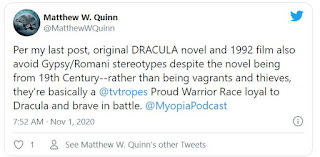For Myopia Movies' Halloween vampire month, we watched the 2004 action-horror film Van Helsing for our Patreon feed (it's not posted yet, but don't worry it'll be there) and the 1992 sort-of classic Bram Stoker's Dracula as a public episode. I posted on Twitter a couple times about the two films' (and possibly the original novel's) portrayal of the Gypsy (Romani) people.
"The Count's gypsies, fearless warriors who are loyal to the death to whatever nobleman they serve - day and night they toil, filling boxes with decrepit earth from the bowels of the castle."
Not only are they NOT work-shy bums and petty criminals, they're very diligent workers and even, to cite TVTropes, a Proud Warrior Race. The "loyal to the death to whatever nobleman they serve" even reminded me of the samurai code of Bushido. Making this particular group of Romani into some kind of band of Eastern European samurai might not be historically accurate (IIRC most Romani were peddlers, metal-workers, etc), but not only is it anti-stereotypical, it's actually kind of cool.
However, I do agree with the "woke" crowd of the importance of varied, non-stereotypical representation of minority groups in media. Not only does it avoid encouraging negative stereotyping and its unfortunate consequences (ranging from the hypocritical snobbery in the Cher song to outright violence like this recent series of attacks on French Romani after rumors of child abduction), but it also allows for more complex and interesting stories.
So here's an idea I had for a Dracula story focused on the Count's Romani servants that takes place during the actual novel. The Gypsies living around Castle Dracula have served him and his vampire brides as general-purpose minions, warriors, etc. for centuries and he in turn has protected them from rampant racism (Gypsies were actually legally enslaved in Romania for a long time) and spared them his predations. Although the Gypsies serving the Count are probably Eastern Orthodox or Catholic, Dracula as a verifiably-real supernatural figure might occupy some kind of spiritual position among them, since regardless of the faith they practice many Romani include certain elements that may date back to India.
But now the Count wants to move to England. As depicted in the book and film most attend to their traditional duties as his servants and bodyguards and some might even think this is a chance to travel to what is to them an exotic new place (Britain), but there is conflict within the community. Some feel like their patron is going to abandon them to the racism and cruelty of broader Romanian culture, while others (perhaps more educated or more zealously religious) have come to realize just what Dracula is and the danger he represents to the wider world. Given how Dracula has historically been the community's protector and how a Romani community in this time and place is more likely to be traditional and insular, the elders might put down grumblings by dissidents. After all, if the alternative is rampant persecution, members of minority groups often have unpleasant choices to make. I'm not going to judge Iraqi, Syrian, and Egyptian Christians for their support of secular dictators and I know darn well why Jews have historically asked "is it good for the Jews?" re: the ascension of a new king or a political development.
However, when Dracula returns to the Transylvania with several hunters hot on his trail, the conflict within the community reignites. As in the book many will fight to the death to protect their Count against outsiders, but others might want to stay out of it or even assist the vampire-hunters. And given what's going to happen to the Gypsies in forty years, the traditionalists may have a very good reason to mourn the loss of their protector.
Given my own work obligations and higher-priority projects, this is something I probably wouldn't write myself. Owing to how it's set so deeply into a culture that's not well-known by outsiders, it might be a good idea for anybody who wants to take this story and run with it to do extensive research. Googling isn't going to be enough unless you find some real primo academic journal articles like this one on Muslim Roma--the Writing Excuses podcast recommended attending festivals to learn about different ethnic groups. Here's a big one in Spain, for example, and another in France. There was a Gypsy music festival in New York City that went virtual due to this year. Failing that, libraries (especially college ones with a lot of really niche books) or someone more familiar with the culture to assist would be good ideas well.


No comments:
Post a Comment